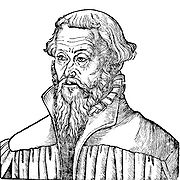
Nicolaus Gallus
Encyclopedia

Köthen (Anhalt)
Köthen is a city in Germany. It is the capital of the district of Anhalt-Bitterfeld in Saxony-Anhalt, about north of Halle.Köthen is the location of the main campus and the administrative center of the regional technical university Hochschule Anhalt which is especially strong in information...
– June, 1570 in Bad Liebenzell
Bad Liebenzell
Bad Liebenzell is a spa town in the Nagold River valley, the northern part of the Black Forest. It was first mentioned in 1090 and is the heart of the Liebenzeller Mission ....
), was leader of the Lutheran Reformation in Regensburg
Regensburg
Regensburg is a city in Bavaria, Germany, located at the confluence of the Danube and Regen rivers, at the northernmost bend in the Danube. To the east lies the Bavarian Forest. Regensburg is the capital of the Bavarian administrative region Upper Palatinate...
.
At Wittenberg, where he became a student in 1530 and received the master's degree in 1537, he won the commendation of Melanchthon. In 1543 Luther sent Hieronymus Nopus as preacher to Regensburg
Regensburg
Regensburg is a city in Bavaria, Germany, located at the confluence of the Danube and Regen rivers, at the northernmost bend in the Danube. To the east lies the Bavarian Forest. Regensburg is the capital of the Bavarian administrative region Upper Palatinate...
at the request of the city council and with him went Gallus, who was ordained by Bugenhagen in April. In 1548 trouble arose in
Regensburg over the acceptance of the Interim
Augsburg Interim
The Augsburg Interim is the general term given to an imperial decree ordered on May 15, 1548, at the 1548 Diet of Augsburg, after Charles V, Holy Roman Emperor, had defeated the forces of the Schmalkaldic League in the Schmalkaldic War of 1546/47...
. Gallus wrote a treatise
against it, and had to leave the city; services in the only Evangelical church there were discontinued. For a time Gallus preached for Cruciger
Caspar Creuziger
Caspar Creuziger or Caspar Cruciger the Elder was a German humanist . He was professor of Theology at the University of Wittenberg, preacher at the Castle Church , secretary to and worked with Martin Luther to revise Luther's German Bible translation..In 1524 he married the former nun Elisabeth...
(who was ill) at Wittenberg
Wittenberg
Wittenberg, officially Lutherstadt Wittenberg, is a city in Germany in the Bundesland Saxony-Anhalt, on the river Elbe. It has a population of about 50,000....
, then in 1549, through the influence of his
brother in law, Heinrich Merkel, city secretary at Magdeburg, he went to
the Ulrich Church in that city. He joined Flacius in opposition to the
adiaphorism of the Wittenberg circle and published a Disputation von Mitteldingen in 1550. He remained in Magdeburg after its capitulation in 1551, and kept up the dispute against Osiander
Andreas Osiander
Andreas Osiander was a German Lutheran theologian.- Career :Born at Gunzenhausen in Franconia, Osiander studied at the University of Ingolstadt before being ordained as a priest in 1520. In the same year he began work at an Augustinian convent in Nuremberg as a Hebrew tutor. In 1522, he was...
and Major
Georg Major
George Major was a Lutheran theologian of the Protestant Reformation. He was born in Nuremberg and died at Wittenberg.-Life:...
. In June, 1553, Prince Wolfgang of Anhalt
Anhalt
Anhalt was a sovereign county in Germany, located between the Harz Mountains and the river Elbe in Middle Germany. It now forms part of the state of Saxony-Anhalt.- Dukes of Anhalt :...
called him to his native city to assist in the settlement of the administration of the church property. In August, 1553, Gallus was called back to Regensburg
Regensburg
Regensburg is a city in Bavaria, Germany, located at the confluence of the Danube and Regen rivers, at the northernmost bend in the Danube. To the east lies the Bavarian Forest. Regensburg is the capital of the Bavarian administrative region Upper Palatinate...
as leader of the Evangelical cause. He worked there for almost seventeen years, and the effects of his activity
were felt far beyond the borders of the town. In the disputes of the following years he fought faithfully on the side of Flacius. Like him he tried to influence Melanchthon by letters, but the latter treated Gallus rather haughtily. It probably angered him that Gallus had republished (1554) his Sententiae veterum de coena Domini, which was directed
against Oecolampadius. In 1561 Gallus warned the princes convened at Naumburg of
the spreading Calvinistic doctrine of the Lord's Supper (see: Crypto-Calvinism
Crypto-Calvinism
Crypto-Calvinism is a term for Calvinist influence in the Lutheran Church during the decades just after the death of Martin Luther . It denotes what was seen as a hidden...
). He also got into a dispute with Brenz
Johannes Brenz
Johann Brenz was a German theologian and the Protestant Reformer of the Duchy of Württemberg.-Early Advocacy of the Reformation:...
, whom he suspected of leanings toward Philippism. From 1562 to 1566 he furnished a refuge to Flacius, who had been expelled
from Jena
Jena
Jena is a university city in central Germany on the river Saale. It has a population of approx. 103,000 and is the second largest city in the federal state of Thuringia, after Erfurt.-History:Jena was first mentioned in an 1182 document...
. Melanchthon reproached Gallus for fighting continually against the Evangelicals, instead of combating Romanism. But the reproach was not pertinent; during the diet in 1556 he preached against the Roman Catholics, and there are still extant manuscripts containing theses of disputation against the Ingolstadt Catholics. In this connection may be mentioned
Gallus' writing directed against Corpus Christi day: Vom abgöttischen Fest, Frohnleichnams-Tag genannt (1561). His congregation esteemed him highly for his zeal in the maintenance of pure doctrine and moral discipline, and his personal life was blameless.

